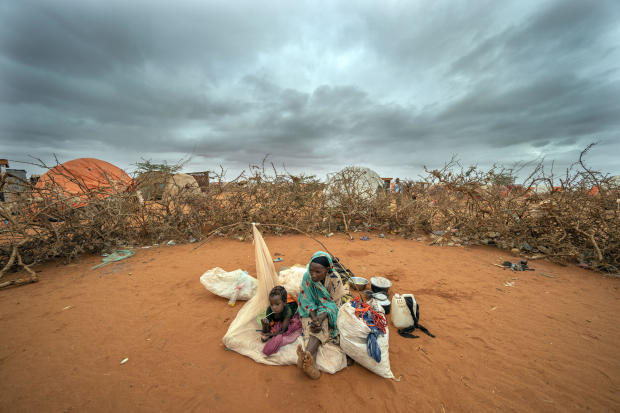
A new report says an estimated 43,000 people died amid the longest drought on record in Somalia last year and half of them likely were children. It is the first official death toll announced in the drought withering large parts of the Horn of Africa, and the report made it clear the “crisis is far from over.”
At least 18,000 people are forecast to die in the first six months of this year, according to the report released Monday by the World Health Organization and the United Nations children’s agency and carried out by the London School of Hygiene and Tropical Medicine.
Somalia and neighboring Ethiopia and Kenya are facing a sixth consecutive failed rainy season while rising global food prices continue to complicate the hunger crisis.

The U.N. and partners earlier this year said they were no longer forecasting a formal famine declaration for Somalia for the time being, but they called the situation “extremely critical” with more than 6 million people hungry in that country alone.
Famine is the extreme lack of food and a significant death rate from outright starvation or malnutrition combined with diseases like cholera. A formal famine declaration means data show that more than a fifth of households have extreme food gaps, more than 30% of children are acutely malnourished and more than two people out of 10,000 are dying every day.
Some humanitarian and climate officials this year have warned that trends are worse than in the 2011 famine in Somalia in which a quarter-million people died.
Millions of livestock have also died in the current crisis, which as CBS News correspondent Debora Patta found herself, has been compounded by climate change and insecurity as Somalia battles thousands of fighters with al Qaeda’s East Africa affiliate, al-Shabaab. The U.N. migration agency says 3.8 million people are displaced, a record high.
The last time a famine was declared in Somalia, in 2011, more than 250,000 people died for lack of nutrition, half of them under the age of five. The world vowed never to let it happen again, but a food security assessment released last month said nearly a half-million children in Somalia were likely to be severely malnourished this year, and many humanitarian officials say the world is looking elsewhere.
“Many of the traditional donors have washed their hands and focused on Ukraine,” the U.N. resident coordinator in Somalia, Adam Abdelmoula, told visiting U.S. Ambassador to the U.N., Linda Thomas-Greenfield, during a briefing in Mogadishu in January.
The stark figures in the new report highlight the extent to which climate change is wreaking havoc on Somalia’s children – among the youngest victims of global warming in a country among those least responsible for carbon emissions.
CBS News visited an intensive care ward where every child was under five, all of them hospitalized by the climate change-induced drought that has left their nation starving.
Late last year, officials said another child in Somalia was being admitted to a hospital suffering from malnutrition every single minute of every day.










